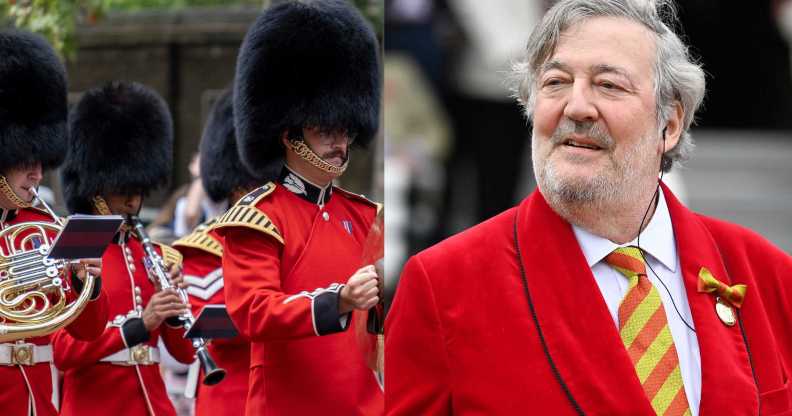Stephen Fry joins calls for end to bear fur on King’s Guard caps

Stephen Fry has joined forces with PETA to call for an end the use of real bear fur in the King’s Guards’ bearskin caps. (Gareth Copley/Mike Kemp/In Pictures/Getty Images)
Gay actor Stephen Fry has joined forces with People for the Ethical Treatment of Animals (PETA) to call for an end to the use of real fur in bearskin caps worn by the King’s Guards.
PETA has called its campaign “UnBEARable Cruelty”, in reference to the tall black bearskin hats the Guards wear.
Bearskin caps are worn at ceremonial military events and on duty, which includes guarding Buckingham Palace. The king and other members of the royal family also wear the caps at parades, such as Trooping the Colour.
“For nearly two centuries, the Ministry of Defence (MoD) has waged war on black bears while doing almost nothing to further the search for materials to replace the use of their skins,” the campaign notes.
It adds that luxury faux furrier Ecopel have revealed the world’s first fake bear fur that is said to be “indistinguishable” from the real thing.
In a video to promote the campaign, and showing how black bears are “mercilessly killed”, Fry, who narrates the clip, says: “Tradition is never an excuse for cruelty”. He also refers to the head gear as “purely ornamental”.
The MoD points out that the fur is from “legal and licensed hunts,” the BBC reported.
“It takes at least one bear to provide enough fur for each cap,” Wilde star Fry claims, before revealing how the animals are killed with crossbow bolts.
“By continuing to purchase caps made of black bear fur, the UK government drives demand for pelts and effectively incentivises hunters.
“Britain has always prided itself on being sporting, but these bears, lured with cookies to the hunters’ hiding place, stand no chance of survival,” he adds.
PETA confirmed it will show the video to King Charles in a bid to inspire him to switch to artificial fur.
Kate Werner, from the charity, said: ”The UK government is sponsoring bait-and-kill sport hunting of mothers and other bears.”
A MoD spokeswomen responded: “To date, and to the department’s knowledge, an alternative has yet to meet the standards required to provide an effective replacement for the bearskin ceremonial caps.”

